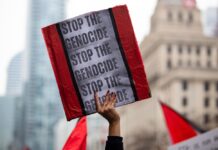The Home Office has listed five Syrian rebel groups as “terrorist” organisations, including the Islamic State of Iraq and al-Sham (ISIS) who are leading the insurgency in Iraq.
The move comes as the Foreign Secretary William Hague told MPs that more than 400 Britons are currently fighting with ISIS in Syria and Iraq. The government fears that some could return to Britain as experienced combatants ready to carry out terrorist attacks.
A Home Office proscription order to be approved by parliament this week will make it illegal to be a member of or to provide support to the Islamic State of Iraq and the Levant, known as ISIS.
Home Office officials said that the move was triggered by the jihadi organisation’s operations in Syria but developments in Iraq had underlined the need to ban the group in Britain.
The four other groups linked with Syria that also face being banned in the UK are Türkiye Halk Kurtulus Partisi-Cephesi (Turkish People’s Liberation Party), Kateeba al-Kawthar, Abdallah Azzam Brigades, including the Ziyad al-Jarrah Battalions; and the Popular Front for the Liberation of Palestine’s (PFLP) General Command.
Security minister James Brokenshire said: “We condemn all acts of terrorism committed in Syria, where the conflict poses a growing threat to the UK, regional and international peace and security. Proscription is a useful weapon in the armoury at the disposal of the government, police and security service to disrupt terrorist activity and protect the UK.”
He added: “We want to send a strong message that terrorist activity is not tolerated wherever it happens.”
Subscribe to our newsletter and stay updated on the latest news and updates from around the Muslim world!
Downing Street said last week that the security services were monitoring very closely the possibility that British jihadists fighting in Syria could be among ISIS fighters that have crossed the border into Iraq.
Origins of ISIS
The proto-ISIS group, Tawhid al-Jihad (TJ) arose during the Iraq war, as a group amongst a coalition of resistance fighters against Iraqi occupation. It changed its name a few times: under Ayman Zawahiri, becoming the “The organisation of the base of Jihad in the land of the two rivers”; then the “Islamic State of Iraq” (ISI) in 2006 from a coalition of multiple resistance movements; and in 2013 it branched into Syria, and appended the title “The Islamic State of Iraq and Syria” (ISIS).
TJ was a home-grown Iraqi group, which strategically allied itself with the international Al-Qaeda franchise to attract funding, resources and Muslim volunteers from outside Iraq to bolster its ranks.
However, it is widely considered to have made a number of strategic mistakes like deeming civilians to be acceptable targets in war. Another strategic mistake was declaring war on Iraq’s Shia Muslims in response to Iraqi collaborators helping the US forces attack and kill Iraqi civilians.
The sectarian war in Iraq got so bad that even Ayman Zawahiri had to plead with them to stop attacking Shia forces and populations, and focus on the US occupation force.
ISIS are currently fighting in two fronts – in Syria against the regime of Bashar al-Assad and in Iraq where they have captured most of the Sunni populated areas including Mosul and now leading the insurgency towards Baghdad.




















